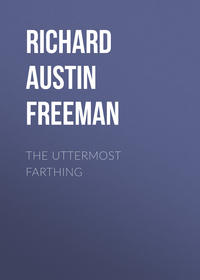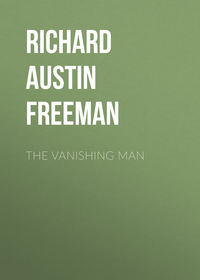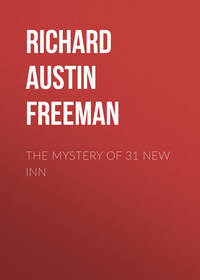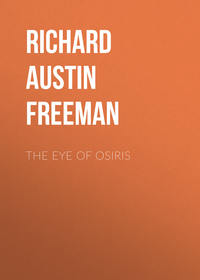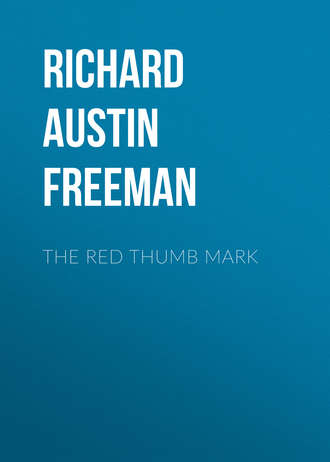 полная версия
полная версияThe Red Thumb Mark
"When he had gone I tried to put the things on the table straight again, and really you might have thought some horrible crime had been committed; the envelopes and papers were all smeared with blood and marked with the print of gory fingers. I remembered it afterwards, when Reuben's thumb-mark was identified, and thought that perhaps one of the papers might have got into the safe by accident; but Mr. Hornby told me that was impossible; he tore the leaf off his memorandum block at the time when he put away the diamonds."
Such was the gist of our conversation as the cab rattled through the streets on the way to the prison; and certainly it contained matter sufficiently important to draw away my thoughts from other subjects, more agreeable, but less relevant to the case. With a sudden remembrance of my duty, I drew forth my notebook, and was in the act of committing the statements to writing, when Thorndyke entered the room.
"Don't let me interrupt you, Jervis," said he. "I will make myself a cup of tea while you finish your writing, and then you shall exhibit the day's catch and hang your nets out to dry."
I was not long in finishing my notes, for I was in a fever of impatience to hear Thorndyke's comments on my latest addition to our store of information. By the time the kettle was boiling my entries were completed, and I proceeded forthwith to retail to my colleague those extracts from my conversation with Juliet that I have just recorded.
He listened, as usual, with deep and critical attention.
"This is very interesting and important," he said, when I had finished; "really, Jervis, you are a most invaluable coadjutor. It seems that information, which would be strictly withheld from the forbidding Jorkins, trickles freely and unasked into the ear of the genial Spenlow. Now, I suppose you regard your hypothesis as having received very substantial confirmation?"
"Certainly, I do."
"And very justifiably. You see now how completely you were in the right when you allowed yourself to entertain this theory of the crime in spite of its apparent improbability. By the light of these new facts it has become quite a probable explanation of the whole affair, and if it could only be shown that Mr. Hornby's memorandum block was among the papers on the table, it would rise to a high degree of probability. The obvious moral is, never disregard the improbable. By the way, it is odd that Reuben failed to recall this occurrence when I questioned him. Of course, the bloody finger-marks were not discovered until he had gone, but one would have expected him to recall the circumstance when I asked him, pointedly, if he had never left bloody finger-prints on any papers."
"I must try to find out if Mr. Hornby's memorandum block was on the table and among the marked papers," I said.
"Yes, that would be wise," he answered, "though I don't suppose the information will be forthcoming."
My colleague's manner rather disappointed me. He had heard my report with the greatest attention, he had discussed it with animation, but yet he seemed to attach to the new and—as they appeared to me—highly important facts an interest that was academic rather than practical. Of course, his calmness might be assumed; but this did not seem likely, for John Thorndyke was far too sincere and dignified a character to cultivate in private life the artifices of the actor. To strangers, indeed, he presented habitually a calm and impassive exterior; but this was natural to him, and was but the outward sign of his even and judicial habit of mind.
No; there was no doubt that my startling news had left him unmoved, and this must be for one of two reasons: either he already knew all that I had told him (which was perfectly possible), or he had some other and better means of explaining the crime. I was turning over these two alternatives, not unobserved by my watchful colleague, when Polton entered the room; a broad grin was on his face, and a drawing-board, that he carried like a tray, bore twenty-four neatly turned boxwood pieces.
Thorndyke at once entered into the unspoken jest that beamed from the countenance of his subordinate.
"Here is Polton with a problem for you, Jervis," he said. "He assumes that I have invented a new parlour game, and has been trying to work out the moves. Have you succeeded yet, Polton?"
"No, sir, I haven't; but I suspect that one of the players will be a man in a wig and gown."
"Perhaps you are right," said Thorndyke; "but that doesn't take you very far. Let us hear what Dr. Jervis has to say."
"I can make nothing of them," I answered. "Polton showed me the drawing this morning, and then was terrified lest he had committed a breach of confidence, and I have been trying ever since, without a glimmer of success, to guess what they can be for."
"H'm," grunted Thorndyke, as he sauntered up and down the room, teacup in hand, "to guess, eh? I like not that word 'guess' in the mouth of a man of science. What do you mean by a 'guess'?"
His manner was wholly facetious, but I professed to take his question seriously, and replied—
"By a guess, I mean a conclusion arrived at without data."
"Impossible!" he exclaimed, with mock sternness. "Nobody but an utter fool arrives at a conclusion without data."
"Then I must revise my definition instantly," I rejoined. "Let us say that a guess is a conclusion drawn from insufficient facts."
"That is better," said he; "but perhaps it would be better still to say that a guess is a particular and definite conclusion deduced from facts which properly yield only a general and indefinite one. Let us take an instance," he continued. "Looking out of the window, I see a man walking round Paper Buildings. Now suppose I say, after the fashion of the inspired detective of the romances, 'That man is a stationmaster or inspector,' that would be a guess. The observed facts do not yield the conclusion, though they do warrant a conclusion less definite and more general."
"You'd have been right though, sir!" exclaimed Polton, who had stepped forward with me to examine the unconscious subject of the demonstration. "That gent used to be the stationmaster at Camberwell. I remember him well."
The little man was evidently greatly impressed.
"I happen to be right, you see," said Thorndyke; "but I might as easily have been wrong."
"You weren't though, sir," said Polton. "You spotted him at a glance."
In his admiration of the result he cared not a fig for the correctness of the means by which it had been attained.
"Now why do I suggest that he is a stationmaster?" pursued Thorndyke, disregarding his assistant's comment.
"I suppose you were looking at his feet," I answered. "I seem to have noticed that peculiar, splay-footed gait in stationmasters, now that you mention it."
"Quite so. The arch of the foot has given way; the plantar ligaments have become stretched and the deep calf muscles weakened. Then, since bending of the weakened arch causes discomfort, the feet have become turned outwards, by which the bending of the foot is reduced to a minimum; and as the left foot is the more flattened, so it is turned out more than the right. Then the turning out of the toes causes the legs to splay outward from the knees downwards—a very conspicuous condition in a tall man like this one—and you notice that the left leg splays out more than the other.
"But we know that depression of the arch of the foot is brought about by standing for long periods. Continuous pressure on a living structure weakens it, while intermittent pressure strengthens it; so the man who stands on his feet continuously develops a flat instep and a weak calf, while the professional dancer or runner acquires a high instep and a strong calf. Now there are many occupations which involve prolonged standing and so induce the condition of flat foot: waiters, hall-porters, hawkers, policemen, shop-walkers, salesmen, and station officials are examples. But the waiter's gait is characteristic—a quick, shuffling walk which enables him to carry liquids without spilling them. This man walks with a long, swinging stride; he is obviously not a waiter. His dress and appearance in general exclude the idea of a hawker or even a hall-porter; he is a man of poor physique and so cannot be a policeman. The shop-walker or salesman is accustomed to move in relatively confined spaces, and so acquires a short, brisk step, and his dress tends to rather exuberant smartness; the station official patrols long platforms, often at a rapid pace, and so tends to take long strides, while his dress is dignified and neat rather than florid. The last-mentioned characteristics, you see, appear in the subject of our analysis; he agrees with the general description of a stationmaster. But if we therefore conclude that he is a stationmaster, we fall into the time-honoured fallacy of the undistributed middle term—the fallacy that haunts all brilliant guessers, including the detective, not only of romance, but too often also of real life. All that the observed facts justify us in inferring is that this man is engaged in some mode of life that necessitates a good deal of standing; the rest is mere guess-work."
"It's wonderful," said Polton, gazing at the now distant figure; "perfectly wonderful. I should never have known he was a stationmaster." With this and a glance of deep admiration at his employer, he took his departure.
"You will also observe," said Thorndyke, with a smile, "that a fortunate guess often brings more credit than a piece of sound reasoning with a less striking result."
"Yes, that is unfortunately the case, and it is certainly true in the present instance. Your reputation, as far as Polton is concerned, is now firmly established even if it was not before. In his eyes you are a wizard from whom nothing is hidden. But to return to these little pieces, as I must call them, for the lack of a better name. I can form no hypothesis as to their use. I seem to have no 'departure,' as the nautical phrase goes, from which to start an inquiry. I haven't even the material for guess-work. Ought I to be able to arrive at any opinion on the subject?"
Thorndyke picked up one of the pieces, fingering it delicately and inspecting with a critical eye the flat base on which it stood, and reflected for a few moments.
"It is easy to trace a connection when one knows all the facts," he said at length, "but it seems to me that you have the materials from which to form a conjecture. Perhaps I am wrong, but I think, when you have had more experience, you will find yourself able to work out a problem of this kind. What is required is constructive imagination and a rigorous exactness in reasoning. Now, you are a good reasoner, and you have recently shown me that you have the necessary imagination; you merely lack experience in the use of your faculties. When you learn my purpose in having these things made—as you will before long—you will probably be surprised that their use did not occur to you. And now let us go forth and take a brisk walk to refresh ourselves (or perhaps I should say myself) after the day's labour.
CHAPTER XI
THE AMBUSH
"I am going to ask for your collaboration in another case," said Thorndyke, a day or two later. "It appears to be one of suicide, but the solicitors to the 'Griffin' office have asked me to go down to the place, which is in the neighbourhood of Barnet, and be present at the post-mortem and the inquest. They have managed to arrange that the inquest shall take place directly after the post-mortem, so that we shall be able to do the whole business in a single visit."
"Is the case one of any intricacy?" I asked.
"I don't think so," he answered. "It looks like a common suicide; but you can never tell. The importance of the case at present arises entirely from the heavy insurance; a verdict of suicide will mean a gain of ten thousand pounds to the 'Griffin,' so, naturally, the directors are anxious to get the case settled and not inclined to boggle over a little expense."
"Naturally. And when will the expedition take place?" I asked.
"The inquest is fixed for to-morrow—what is the matter? Does that fall foul of any arrangement of yours?"
"Oh, nothing of any importance," I replied hastily, deeply ashamed of the momentary change of countenance that my friend had been so quick to observe.
"Well, what is it?" persisted Thorndyke. "You have got something on."
"It is nothing, I tell you, but what can be quite easily arranged to suit your plans."
"Cherchez la—h'm?" queried Thorndyke, with an exasperating grin.
"Yes," I answered, turning as red as a pickled cabbage; "since you are so beastly inquisitive. Miss Gibson wrote, on behalf of Mrs. Hornby, asking me to dine with them en famille to-morrow evening, and I sent off an acceptance an hour ago."
"And you call that 'nothing of any importance'!" exclaimed Thorndyke. "Alas! and likewise alackaday (which is an approximately synonymous expression)! The age of chivalry is past, indeed. Of course you must keep your appointment; I can manage quite well alone."
"We shouldn't be back early enough for me to go to Kensington from the station, I suppose?"
"No; certainly not. I find that the trains are very awkward; we should not reach King's Cross until nearly one in the morning."
"Then, in that case, I shall write to Miss Gibson and excuse myself."
"Oh, I wouldn't do that," said Thorndyke; "it will disappoint them, and really it is not necessary."
"I shall write forthwith," I said firmly, "so please don't try to dissuade me. I have been feeling quite uncomfortable at the thought that, all the time I have been in your employ, I seem to have done nothing but idle about and amuse myself. The opportunity of doing something tangible for my wage is too precious to be allowed to slip."
Thorndyke chuckled indulgently. "You shall do as you please, my dear boy," he said; "but don't imagine that you have been eating the bread of idleness. When you see this Hornby case worked out in detail, you will be surprised to find how large a part you have taken in unravelling it. Your worth to me has been far beyond your poor little salary, I can assure you."
"It is very handsome of you to say that," I said, highly gratified to learn that I was really of use, and not, as I had begun to suspect, a mere object of charity.
"It is perfectly true," he answered; "and now, since you are going to help me in this case, I will set you your task. The case, as I have said, appears to be quite simple, but it never does to take the simplicity for granted. Here is the letter from the solicitors giving the facts as far as they are known at present. On the shelves there you will find Casper, Taylor, Guy and Ferrier, and the other authorities on medical jurisprudence, and I will put out one or two other books that you may find useful. I want you to extract and make classified notes of everything that may bear on such a case as the present one may turn out to be. We must go prepared to meet any contingency that may arise. This is my invariable practice, and even if the case turns out to be quite simple, the labour is never wasted, for it represents so much experience gained."
"Casper and Taylor are pretty old, aren't they?" I objected.
"So is suicide," he retorted drily. "It is a capital mistake to neglect the old authorities. 'There were strong men before Agamemnon,' and some of them were uncommonly strong, let me tell you. Give your best attention to the venerable Casper and the obsolete Taylor and you will not be without your reward."
As a result of these injunctions, I devoted the remainder of the day to the consideration of the various methods by which a man might contrive to effect his exit from the stage of human activities. And a very engrossing study I found it, and the more interesting in view of the problem that awaited solution on the morrow; but yet not so engrossing but that I was able to find time to write a long, rather intimate and minutely explanatory letter to Miss Gibson, in which I even mentioned the hour of our return as showing the impossibility of my keeping my engagement. Not that I had the smallest fear of her taking offence, for it is an evidence of my respect and regard for her that I cancelled the appointment without a momentary doubt that she would approve of my action; but it was pleasant to write to her at length and to feel the intimacy of keeping her informed of the details of my life.
The case, when we came to inquire into it on the spot, turned out to be a suicide of the most transparent type; whereat both Thorndyke and I were, I think, a little disappointed—he at having apparently done so little for a very substantial fee, and I at having no opportunity for applying my recently augmented knowledge.
"Yes," said my colleague, as we rolled ourselves up in our rugs in adjacent corners of the railway carriage, "it has been a flat affair, and the whole thing could have been managed by the local solicitor. But it is not a waste of time after all, for, you see, I have to do many a day's work for which I get not a farthing of payment, nor even any recognition, so that I do not complain if I occasionally find myself receiving more payment than my actual services merit. And as to you, I take it that you have acquired a good deal of valuable knowledge on the subject of suicide, and knowledge, as the late Lord Bacon remarked with more truth than originality, is power."
To this I made no reply, having just lit my pipe and feeling uncommonly drowsy; and, my companion having followed my example, we smoked in silence, becoming more and more somnolent, until the train drew up in the terminus and we turned out, yawning and shivering, on to the platform.
"Bah!" exclaimed Thorndyke, drawing his rug round his shoulders; "this is a cheerless hour—a quarter past one. See how chilly and miserable all these poor devils of passengers look. Shall we cab it or walk?"
"I think a sharp walk would rouse our circulation after sitting huddled up in the carriage for so long," I answered.
"So do I," said Thorndyke, "so let us away; hark forward! and also Tally Ho! In fact one might go so far as to say Yoicks! That gentleman appears to favour the strenuous life, if one may judge by the size of his sprocket-wheel."
He pointed to a bicycle that was drawn up by the kerb in the approach—a machine of the road-racer type, with an enormous sprocket-wheel, indicating a gear of, at least, ninety.
"Some scorcher or amateur racer, probably," I said, "who takes the opportunity of getting a spin on the wood pavement when the streets are empty." I looked round to see if I could identify the owner, but the machine appeared to be, for the moment, taking care of itself.
King's Cross is one of those districts of which the inhabitants are slow in settling down for the night, and even at a quarter past one in the morning its streets are not entirely deserted. Here and there the glimmer of a street lamp or the far-reaching ray from a tall electric light reveals the form of some nocturnal prowler creeping along with cat-like stealthiness, or bursting, cat-like, into unmelodious song. Not greatly desirous of the society of these roysterers, we crossed quickly from the station into the Gray's Inn Road, now silent and excessively dismal in aspect, and took our way along the western side. We had turned the curve and were crossing Manchester Street, when a series of yelps from ahead announced the presence of a party of merry-makers, whom we were not yet able to see, however, for the night was an exceptionally dark one; but the sounds of revelry continued to increase in volume as we proceeded, until, as we passed Sidmouth Street, we came in sight of the revellers. They were some half-dozen in number, all of them roughs of the hooligan type, and they were evidently in boisterous spirits, for, as they passed the entrance to the Royal Free Hospital, they halted and battered furiously at the gate. Shortly after this exploit they crossed the road on to our side, whereupon Thorndyke caught my arm and slackened his pace.
"Let them draw ahead," said he. "It is a wise precaution to give all hooligan gangs a very wide berth at this time of night. We had better turn down Heathcote Street and cross Mecklenburgh Square."
We continued to walk on at reduced speed until we reached Heathcote Street, into which we turned and so entered Mecklenburgh Square, where we mended our pace once more.
"The hooligan," pursued Thorndyke, as we walked briskly across the silent square, "covers a multitude of sins, ranging from highway robbery with violence and paid assassination (technically known as 'bashing') down to the criminal folly of the philanthropic magistrate, who seems to think that his function in the economy of nature is to secure the survival of the unfittest. There goes a cyclist along Guildford Street. I wonder if that is our strenuous friend from the station. If so, he has slipped past the hooligans."
We were just entering Doughty Street, and, as Thorndyke spoke, a man on a bicycle was visible for an instant at the crossing of the two streets. When we reached Guildford Street we both looked down the long, lamp-lighted vista, but the cyclist had vanished.
"We had better go straight on into Theobald's Road," said Thorndyke, and we accordingly pursued our way up the fine old-world street, from whose tall houses our footfalls echoed, so that we seemed to be accompanied by an invisible multitude, until we reached that part where it unaccountably changes its name and becomes John Street.
"There always seems to me something very pathetic about these old Bloomsbury streets," said Thorndyke, "with their faded grandeur and dignified seediness. They remind me of some prim and aged gentlewoman in reduced circumstances who—Hallo! What was that?"
A faint, sharp thud from behind had been followed instantly by the shattering of a ground-floor window in front.
We both stopped dead and remained, for a couple of seconds, staring into the gloom, from whence the first sound had come; then Thorndyke darted diagonally across the road at a swift run and I immediately followed.
At the moment when the affair happened we had gone about forty yards up John Street, that is, from the place where it is crossed by Henry Street, and we now raced across the road to the further corner of the latter street. When we reached it, however, the little thoroughfare was empty, and, as we paused for a moment, no sound of retreating footsteps broke the silence.
"The shot certainly came from here!" said Thorndyke; "come on," and he again broke into a run. A few yards up the street a mews turns off to the left, and into this my companion plunged, motioning me to go straight on, which I accordingly did, and in a few paces reached the top of the street. Here a narrow thoroughfare, with a broad, smooth pavement, bears off to the left, parallel with the mews, and, as I arrived at the corner and glanced up the little street, I saw a man on a bicycle gliding swiftly and silently towards Little James' Street.
With a mighty shout of "Stop thief!" I started in hot pursuit, but, though the man's feet were moving in an apparently leisurely manner, he drew ahead at an astonishing pace, in spite of my efforts to overtake him; and it then dawned upon me that the slow revolutions of his feet were due, in reality, to the unusually high gear of the machine that he was riding. As I realised this, and at the same moment recalled the bicycle that we had seen in the station, the fugitive swung round into Little James' Street and vanished.
The speed at which the man was travelling made further pursuit utterly futile, so I turned and walked back, panting and perspiring from the unwonted exertion. As I re-entered Henry Street, Thorndyke emerged from the mews and halted on seeing me.
"Cyclist?" he asked laconically, as I came up.
"Yes," I answered; "riding a machine geared up to about ninety."
"Ah! he must have followed us from the station," said Thorndyke. "Did you notice if he was carrying anything?"
"He had a walking-stick in his hand. I didn't see anything else."
"What sort of walking-stick?"
"I couldn't see very distinctly. It was a stoutish stick—I should say a Malacca, probably—and it had what looked like a horn handle. I could see that as he passed a street lamp."
"What kind of lamp had he?"
"I couldn't see; but, as he turned the corner, I noticed that it seemed to burn very dimly."


